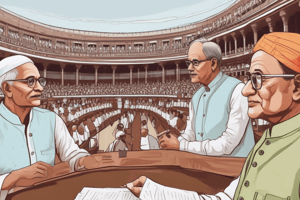Podcast
Questions and Answers
What is the role of the President within the Union Parliament?
What is the role of the President within the Union Parliament?
- To appoint the Prime Minister
- To enact laws independently
- To dissolve the Parliament at will
- To serve as the head of state and commander-in-chief of the armed forces (correct)
How is the President of India elected?
How is the President of India elected?
- By an Electoral College comprising members of Parliament and state legislative assemblies (correct)
- By a special committee of Supreme Court judges
- By appointment from the Prime Minister
- By a direct vote of the Indian citizens
What is the primary function of the Rajya Sabha within the Indian Parliament?
What is the primary function of the Rajya Sabha within the Indian Parliament?
- Serve as a checking and balancing force to the Lok Sabha (correct)
- Elect the President
- Propose amendments to the Constitution
- Enact budget bills
How many members does the Rajya Sabha comprise?
How many members does the Rajya Sabha comprise?
What is the term length for members of the Rajya Sabha?
What is the term length for members of the Rajya Sabha?
In what manner does the President act regarding the advice of the Council of Ministers?
In what manner does the President act regarding the advice of the Council of Ministers?
How are members of the Lok Sabha elected?
How are members of the Lok Sabha elected?
What is the role of the Lok Sabha in Indian Parliament?
What is the role of the Lok Sabha in Indian Parliament?
What is a fundamental responsibility of the Union Parliament?
What is a fundamental responsibility of the Union Parliament?
How does the Union Parliament influence state governments?
How does the Union Parliament influence state governments?
What is a key aspect of India's federal system?
What is a key aspect of India's federal system?
How long do members of the Lok Sabha serve?
How long do members of the Lok Sabha serve?
Flashcards are hidden until you start studying
Study Notes
The Union Parliament: A Pillar of Indian Democracy
The Union Parliament, an essential institution in the framework of India's democratic system, embodies the collective wisdom and will of the nation. Comprising the President, the Rajya Sabha (Council of States), and the Lok Sabha (House of the People), the Union Parliament represents a balance of federal and democratic principles, and its history spans over seven decades.
The President
The President is a symbolic figurehead of the Indian nation and a vital element of the Union Parliament. Elected by an Electoral College comprising members of both Houses of Parliament and state legislative assemblies, the President serves as the head of state and commander-in-chief of the armed forces. While the President holds significant powers, they are largely ceremonial and symbolic. In reality, the President's role is to uphold the constitution, convene the Parliament, and act on the advice of the Council of Ministers, led by the Prime Minister.
Rajya Sabha
The Rajya Sabha is the upper house of the Indian Parliament, and it comprises 245 members, with 233 members elected by state and territorial legislative assemblies, and 12 members nominated by the President. Members of the Rajya Sabha serve for a term of six years, one-third of the total membership retiring every two years. The Rajya Sabha primarily functions as a checking and balancing force to the Lok Sabha, and it also plays a crucial role in the process of passing bills.
Lok Sabha
The Lok Sabha, commonly called the House of the People, is the lower house of the Indian Parliament, and it comprises 545 members—543 elected by direct popular vote, and two nominated by the President. Members of the Lok Sabha serve for a term of five years, unless the House is dissolved earlier. The Lok Sabha is responsible for passing legislation, approving the budget, and debating and discussing national issues. The Lok Sabha has more members than the Rajya Sabha, and its members are directly elected by the people, making it more representative of the Indian population.
The Role of the Union Parliament
A fundamental responsibility of the Union Parliament is the creation of laws and policy, ensuring the wellbeing and security of the Indian people. The Parliament also plays a critical role in approving the budget, ensuring the government follows fiscal discipline and prioritizes national development. Elected representatives debate, discuss, and pass bills on a wide range of issues, from national security to social welfare, to maintain a healthy democratic discourse and ensure the government's accountability to the people.
The Relationship Between the Union Parliament and State Legislatures
The Indian Constitution provides for a system of federalism, in which power is divided between the Union Parliament and the state legislatures. The Union Parliament has exclusive power over several subjects, including foreign affairs, defense, and inter-state trade. State legislatures have power over subjects such as agriculture, public health, and education. The Union Parliament, through its financial and legislative powers, can also influence the state governments. For instance, the Union Parliament can pass laws that apply to all states or create special provisions for certain states, such as financial assistance or administrative reforms.
In summary, the Union Parliament is a vital institution in India's democratic system, serving as a platform for debate, deliberation, and the passage of laws that govern the country. Through its constituent parts, the President, the Rajya Sabha, and the Lok Sabha, the Union Parliament reflects the will of the people and ensures their representation in government. The Union Parliament's role in maintaining a balance between federal and democratic principles remains an essential component of India's democratic system.
Studying That Suits You
Use AI to generate personalized quizzes and flashcards to suit your learning preferences.




